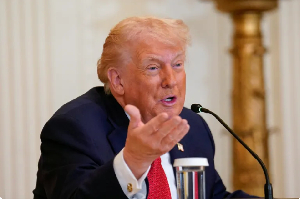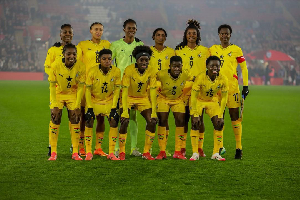: From 'Baloney!' To 'What’s In It For Us'? Part Two." by Nana Akyea Mensah, the Odikro...
INTRODUCTION:
This is a second part of my reaction to Mr. Ochere Darko's article Obama’s Visit – What’s In It For Us And U.S.?
"This article is bound to have two parts or more. This is because I feel I am already suppressing my disdain, finding it difficult to believe that we have been lied to over such a serious matter, and refusing to appreciate why Ghanaians should even be called upon to accept a US military bases here simply because it is a done deal! I am sure we shall need to talk about all of that, but first of all, I wish to take some time to express my shock and dismay with all my might of wonder, to learn that what was openly referred to as "Baloney" and nothing to worry about is underway, far advanced, and virtually inevitable! I am very angry that Ghanaians have been lied to so blatantly by their own elected President. Boiling at the autocratic insolence behind the "what's in it for us?" question that Mr. Ochere-Darko is now posing. I am certainly amazed that a matter of fundamental concern to each and every citizen could be cooked up to such an extent without an open and frank national democratic debate whatsoever!"
THE OCHERE-DARKO THESIS:
Naturally, in the second part I would like to settle down to the essential thesis of Mr. Ochere Darko and deal with them one by one. I shall quote extensively to those who have not read the article together on one page. Mr Ochere Darko does not mince his words:
"This article argues that in the excitement surrounding President Obama’s July visit to Ghana, what has been missing is an analysis of what is in it for the United States, an understanding of which is crucial for Ghana if it is to capitalise on the immense opportunity provided by this trip. Highlighting the significance of the deepwater oil find in 2007, the article sets out why Ghana is now the subject of strategic U.S. energy and military interests which, as far as the Obama administration is concerned, has raised the stakes considerably in Ghana–United States relations. As the potential gem in the crown of what Washington terms Africa's ‘New Gulf’, the article highlights how Ghana’s pending oil-rich status will shift the terms of negotiation during the trip. Furthermore, America’s preference for Ghana as the physical location for the U.S. African Command (AFRICOM) headquarters, and its concern not to cede strategic ground to China in this region, mean that in 2009 Ghana has an unprecedented hand of cards to play in this game of international diplomacy. Our task as a nation – and the Government’s task as our representatives - is to make the strategic decisions to ensure that we aren’t simply the honoured recipients of President Obama’s first visit to Africa, but that we come away with more concrete deliverables to help us meet our own strategic goals."
The thrust of his thesis is that the US wants to establish military bases in Ghana and it is up to us to make the strategic choice which would lead us to the economic Nirvana. There is no doubt in the writer's mind what choice we ought to make:
"Top on the list is the United States’ military and energy security agenda. Before the 9/11 bombing in 2001, conventional thinking in Washington perceived no vital strategic interests for the U.S. in sub-Saharan Africa. But this has changed. Today we can see a significant shift away from America’s traditional geopolitical calculations regarding oil production and supply. The U.S.’s National Intelligence Council (NIC) estimates that by 2015, 25 percent of American oil imports will come from West Africa, compared to 16% today – an estimate even considered as too conservative in some quarters. Already West Africa supplies as much oil to the U.S. as Saudi Arabia. Furthermore, our oil is light and sweet, making it easier and cheaper to refine than Persian oil. Plus its offshore location reduces transportation costs and minimises risk of political violence and terrorist attacks."
He therefore recommends:
"The way forward is a pro-active policy to build a new Gulf of energy security and prosperity in a part of the world that is relatively receptive to American presence. With significant discoveries being made in the Gulf of Guinea oil basin, off the coast of Ghana, Equatorial Guinea, Congo and Cote d’Ivoire, according to the Energy Information Administration of the U.S. Department of Energy, the United States will be importing in the year 2020 over 770 million barrels of African oil a year. And Ghana with its stability, notable responsiveness to America, deepening multiparty democracy and promising investment climate is seen as the perfect epicentre for the growth and fulfilment of this interest. In the eyes of America, geography, geology and ideology all favour Ghana as the gem in the crown of this new policy."
Mr Ochere Darko argues that:
"Furthermore, the U.S. is, understandably, bent on establishing a regional command for Africa, similar to U.S. Forces Korea, with a homeport situated on the African continent to protect their interests. West Africa is its natural home, given the need to protect energy interests in the Gulf of Guinea. Liberia has offered but simply cannot match the kind of convenience available in Ghana. It can be a win-win situation.
AFRICOM can protect U.S. investments in our region. But, those investments (regardless of our percentage share of ownership) are also fundamentally our investments – and thus the assistance in their protection will be a welcome boon. U.S. military presence can also help improve the level of military professionalism of our already well-respected troops. It is interesting to note that in the six decades since World War II in which America has maintained a military presence in other sovereign nations, none of the host nations has suffered instability or military takeovers, as the presence of U.S. troops helps entrench the subordination of soldiers to civil leadership. Moreover the presence of U.S. troops boosts social and economic activities in the host countries, too."
WHAT IS WRONG WITH DOING BUSINESS WITH CHINA? I should like to begin by raising a fundamental question that separates our interests as Africans from the interests of the Americans. Your argument is that it is not in the interest of the US that Africa develops closer relations with China. On the other hand, Africans obviously have no problem doing business with China particularly because of their very generous terms. Every free nation has the right to do business with whomsoever he wants. When the US was doing business with Apartheid South Africa and vetoing UN Security Council resolutions calling for sanctions against the apartheid state, as if there was no tomorrow, no one talked of an African Military command to go and pump some sense into the heads of Senators like Dick Cheney, one of the key brains behind the connection between Africa's oil and US military, who systematically voted to keep the apartheid status quo, including keeping Mr. Nelson Mandela in prison as a terrorist! Ghanaians, Africans and Chinese are nations full of law abiding adults, the principles of the so-called free markets are not violated by the trade relations between these nations, so why a military response to that? Fundamentally it may make sense to people like Dick Cheney who make more money in times of war and make less in time of peace.
One would have thought that having made the strategic choice to go in with the Americans to militarily chase the Chinese out of Africa, he would advance some cogent reasons why Africa should not be doing business with China. Quite to the contrary, Mr. Ochere-Darko is full of praises for the Chinese:
"Africans believe they are increasingly feeling more and more the positive might of Beijing in their quest for advancement. Chinese investment deserves a big part of the credit for Africa’s highest ever economic growth rate, 5.8 percent in 2007. Furthermore, China has cancelled $10 billion in bilateral debt owed to it by African countries."
So my question to Mr Ochere Darko is why should we side with the Americans to chase away the Chinese from Africa? For the simple reason that they have a black president? Is that the reason why you smell the meat in your soup?
What Mr. Ochere Darko failed to take into account is that even though what he is saying about the US intention to chase the Chinese out of Africa is true, the Americans themselves have become increasingly embarrassed by that "problem" of theirs to the extent that as far as last year, President George Bush was compelled to lie between the teeth: Bush reassures Africa no plans for new U.S. bases,
"Bush said the United States and China, whose growing influence in Africa is seen by some Western diplomats as undermining efforts to encourage good governance, could both pursue opportunities there without stoking rivalry.
China has ramped up its investment across Africa in recent years in return for access to oil, metals and other raw materials to fuel its rapidly expanding economy.
"I don't view Africa as zero sum for China and the United States. I think we can pursue agendas without creating a great sense of competition," Bush said.
"Do I view China as a fierce competitor on the continent of Africa? No I don't."
It was so flagrant he was unwittingly contradicted by his own loyal slave, the then President of Ghana, Mr. John Agyekum Kufour:
The BBC reports
"China is busy building bridges and investing in infrastructure across the continent, in return for oil and minerals to fuel its rapidly expanding economy.
By coming here and showing how the US is spending money in Africa too, Mr Bush is signalling to China that America is a player here as well.
He played down the idea of China as a rival, saying there was room for both countries here. But President John Kufour of Ghana told reporters China is very competitive if Africa wants to buy something, coming to the continent not as a colonial power but as a guest."
I need more convincing why innocent African villagers should be caught up in a fierce battle for petrol as if it is a no-man's land! Why should any one die because some multinationals want to chase the Chinese away? I am happy you brought up the issue of China because it has been so ridiculous watching them trying to cover up that fundamental objective and begin to focus on other missions for the Africom away from the Chinese, such as the one which projects the US Army to fight diseases such as AIDS and malaria. Apparently, if I got it right, the US Army now to hunt down the AIDS virus with nuclear bombs or built detention centres for mosquitoes for interrogations and water boarding! Meanwhile fighting disease is a job so many Cuban doctors are doing very well in Africa without a single gun, in spite of crippling US sanctions againt the heroic island!
Amazingly, whilst recommending the Africom headquarters for Ghana for the obvious advantage of the US protegé party the NPP, Mr. Ochere Darko does not shy away from contradicting himself:
"If the U.S. wants to out-muscle China in the 21st century scramble for Africa, then it will have to show more aggression in investing in the development of infrastructure on the continent, as China is doing. Even if American money comes with job for American companies, Africans are not likely to complain so long as it ends in the brick and mortar of the continent’s infrastructural development. Africans believe they are increasingly feeling more and more the positive might of Beijing in their quest for advancement. Chinese investment deserves a big part of the credit for Africa’s highest ever economic growth rate, 5.8 percent in 2007. Furthermore, China has cancelled $10 billion in bilateral debt owed to it by African countries."
I rest my case of the fundamental objective of Africom and China. The next article shall focus on the total bankruptcy of ideas and morals of the Danquah Institute as mirrored through the article of its Executive Director, and the kind of threats that they pose to our democracy, stability, peace and social progress. I am going to take my time to talk a little bit about the following quote:
"The United States, in typical Dick Cheneyic oilthink, sees the Gulf of Guinea as offering the opportunity to break with the old politics which saw the U.S. at the mercy of the geostrategic pressure of unstable or unfriendly oil-producing states in the ‘old’ Gulf (Persian Gulf) and Venezuela."
- Mr. Ochere Darko, Obama’s Visit – What’s In It For Us And U.S.?
TO BE CONTINUED...
There links to most of the quotations cited. If they do not appear in this publication you may access all links from the original on my bolg here:
http://nanaakyeamensah.blogspot.com/2009/07/us-military-base-in-ghana-from-baloney.html
Thank you for your kind attention,
Nana Akyea Mensah http://nanaakyeamensah.blogspot.com/
Opinions of Saturday, 11 July 2009
Columnist: Mensah, Nana Akyea














